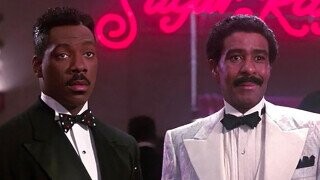Richard Pryor Bet Eddie Murphy A Hundred Grand That He Wouldn’t Make a Music Album Without Jokes in It

I don’t know which move is more foolish — betting against Eddie Murphy’s ability to break into a new artistic medium, or expecting Richard Pryor to pay up.
Like so many comedians who came after Pryor, Murphy considers the late stand-up legend to be his biggest hero. Pryor’s barrier-breaking run of controversial and influential comedy throughout the 1970s paved the way for Murphy’s dominance in the 1980s as he skyrocketed to the top of the stand-up scene and single-handedly saved Saturday Night Live from abject irrelevance on the way to a multi-hyphenate movie and TV career — with a little detour to the middle of the music charts.
Don't Miss
Two years before Murphy made his smash-hit stand-up movie Raw, he took a much gentler approach to his artistry with his 1985 R&B album How Could It Be, which peaked at #26 on the Billboard 200 and even scored a #2 single with “Party All the Time,” all without Murphy slipping in a single punchline. A poll of comedy and music fans in 1984 probably would show that most people didn’t expect Murphy to be able to pull off a successful music debut without any comedy elements. However, unlike Pryor, most people wouldn’t put six figures on that hunch.
On last night’s Jimmy Kimmel Live!, Kimmel asked Murphy about a liner note on his debut R&B album, which famously reads, “To Richard Pryor, my idol, with whom I have a $100,000 bet. No, motherfucker, I didn’t forget.”
Murphy told Kimmel, “When I told (Pryor) that I was doing a music album, he bet me a hundred thousand dollars that I wouldn’t put out a music album where there’s no jokes, no nothing, just music.” Not to be deterred, Murphy kept his face straight and his rhythms smooth on How Could It Be. “I bet him a hundred thousand dollars, and I did it,” Murphy recalled.
“He never paid me!” Murphy revealed, though he clarified that, beyond the passive-aggressive album note, he took no action toward holding Pryor to his word or shaking down his greatest hero to collect on his gambling debts. Said Murphy, “I never brought it up. We did a movie, we did Harlem Nights, and I never said anything.”
Considering the extensive issues in Pryor’s personal life at the time — post-setting himself on fire, pre-multiple sclerosis diagnosis and between his first and second heart attacks — it’s probably for the best that Murphy never tried to recoup his hard-earned winnings. Pryor learned a valuable lesson about doubting his protege, but Murphy probably knew his biggest takeaway already – never expect a guy who freebases blow to have massive amounts of cash on hand.